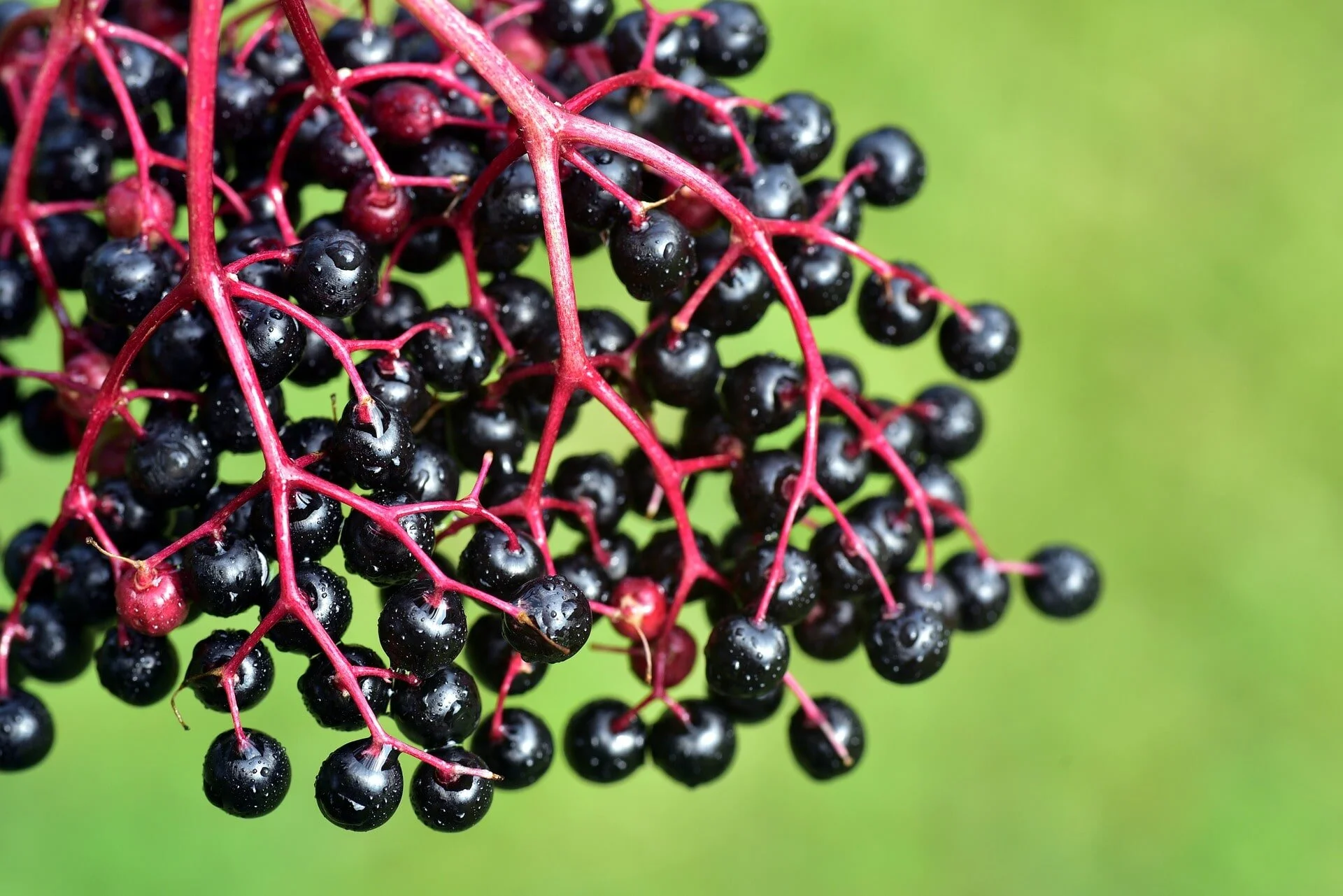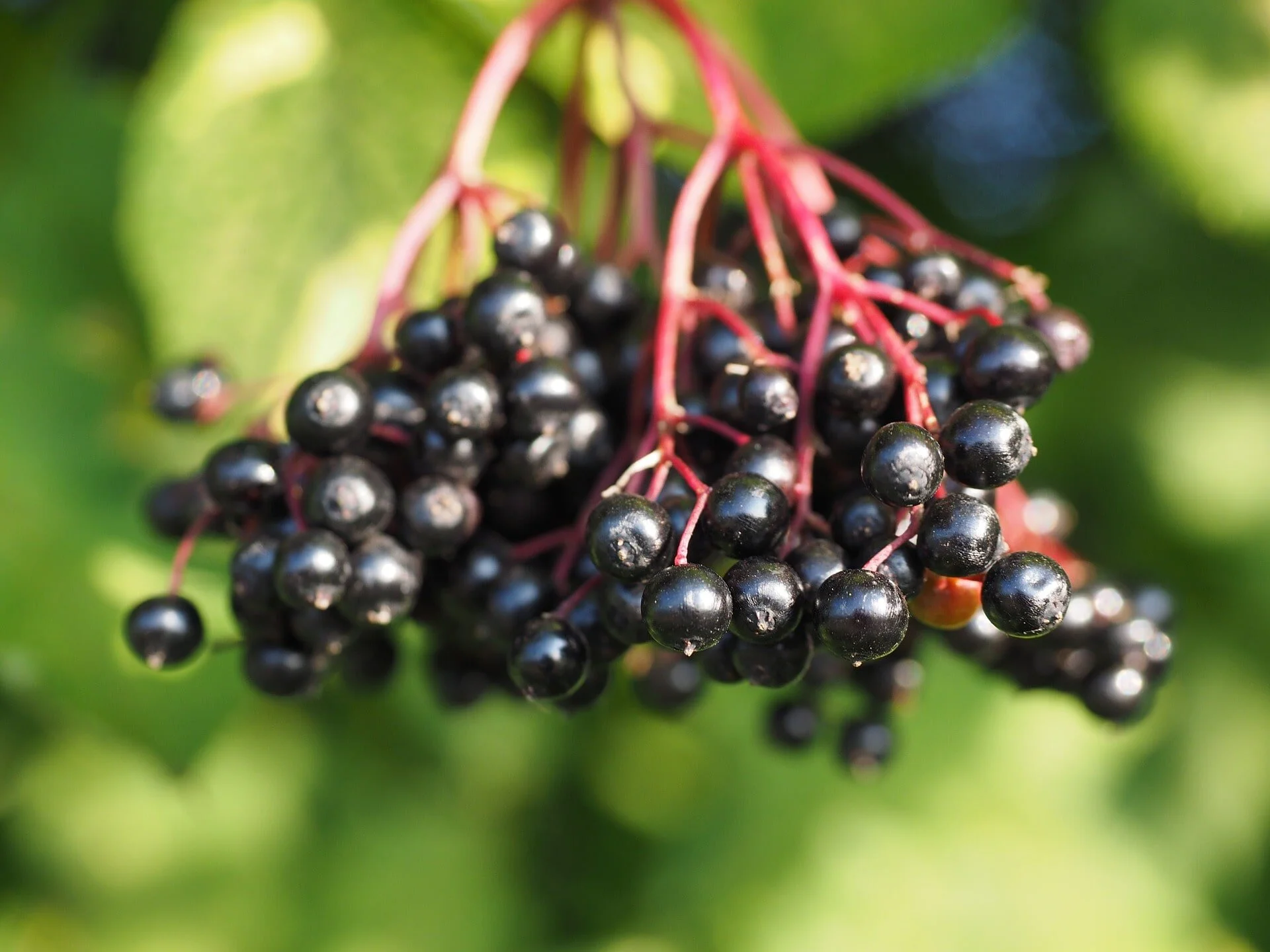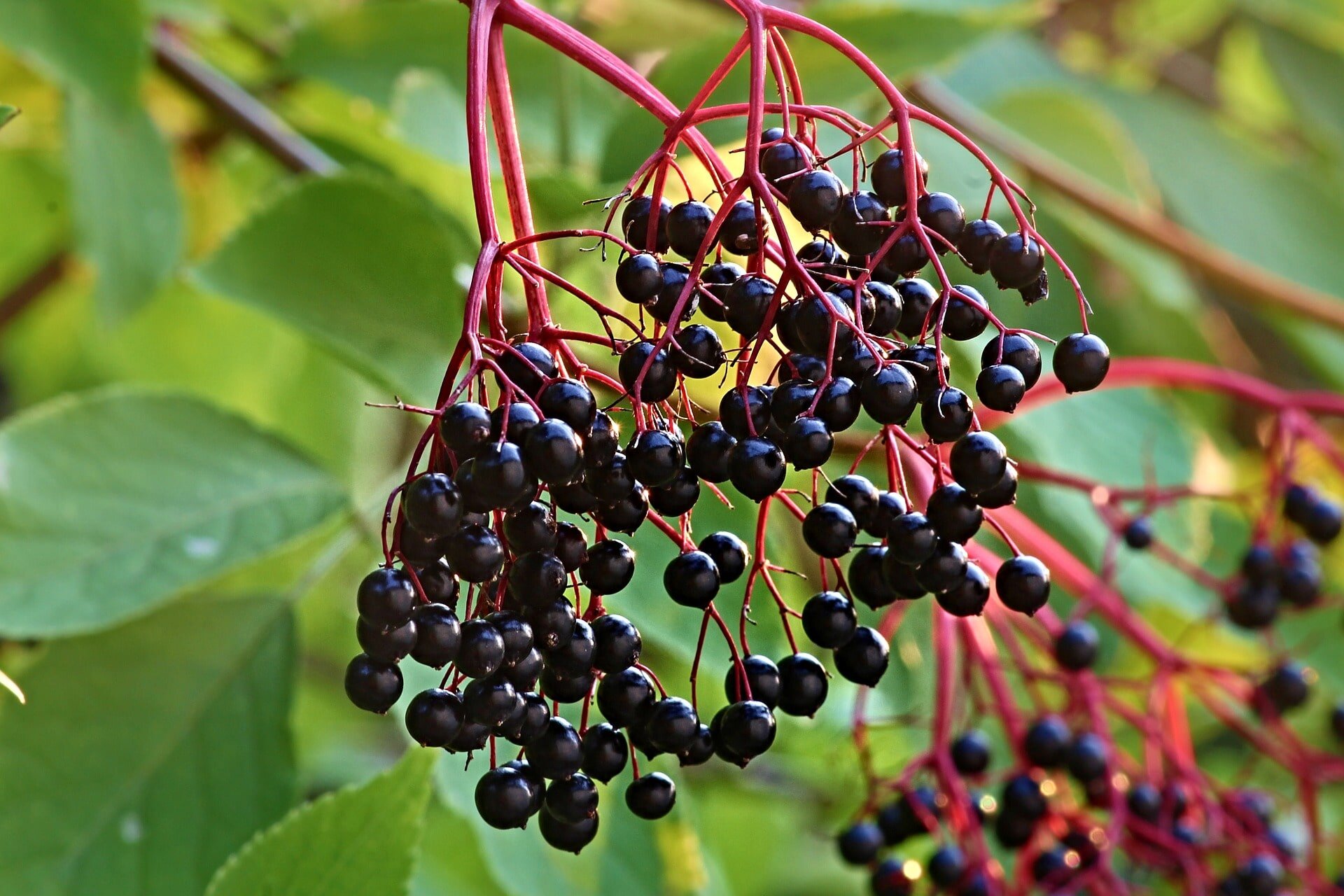Elderberry and Respiratory Viruses
Disclaimer: The research below is offered for information and educational purposes only and is not intended to provide medical advice. See Terms & Conditions
Respiratory Viruses and
Elderberry
Introduction to Elderberry
Elderberry (Sambucus nigra) is a flowering plant from Europe that is rich in nutrients and has been used for many years in folk medicine. Scientists have explored potential properties in elderberry that may make it a powerful dietary supplement. Studies suggest elderberry may possess antibacterial, antidepressant, antitumor, and antiviral properties. Antiviral research has suggested a variety of applications for elderberry as a supplement, especially as a treatment for the symptoms of respiratory illnesses caused by viral infections. [Ref #1]
Elderberry and Coronaviruses
Coronavirus, an RNA-enveloped virus, is a common circulating virus. It causes typical symptoms of respiratory illness such as cough, sore throat, and fever. However, in certain populations coronaviruses can cause more intense symptoms and develop into pneumonia or bronchiolitis. In the winter, 8.4% of pneumonia hospitalizations are due to human coronavirus. Scientists investigated the use of Sambucus FormosanaNakai (a species of elderberry) against a strain of coronavirus in an in vitro experiment and found promising results. [Ref #2]
“The study demonstrated the potent anti-HCoV-NL-63 activity of Sambucus FormosanaNakai extract through the significant reduction of virus yield, plaque formation and virus attachment. Caffeic acid, chlorogenic acid and gallic acid were reported as the phenolic acid constituents in the Sambucus FormosanaNakai extract, exhibiting the antiviral capacity with reducing the production of progeny HCoV-NL63 particles in vitro. Moreover, caffeic acid plays the important component with antiviral activity, as suggested to influence the binding of HCoV-NL63 to the co-receptors (such heparan sulfate proteoglycans) and receptor (ACE2). Like Sambucus nigra L., Sambucus FormosanaNakai might process the antiviral features against the broad spectrum of human respiratory coronaviruses, as useful for developing the antiviral agents in the future.” [Ref #2]
The study found that the elderberry extract demonstrated effective antiviral control of human coronavirus in a couple different ways. It significantly reduced the production of the virus particles, thereby decreasing the total amount of virus in the experiment. Additionally, a phenolic acid in the elderberry extract lessened the ability of the virus to attach to the cell surface and form plaques (regions of viral cell destruction). [Ref #2]
Coronaviruses can affect both the upper and lower respiratory systems and can cause symptoms such as cough and sore throat, among others. A clinical trial in 2019, demonstrated potential beneficial effects of elderberry supplementation on upper respiratory symptoms.
“This analysis included a total of 180 participants and evaluates moderators such as vaccination status and cause of the upper respiratory symptoms. Supplementation with elderberry was found to substantially reduce upper respiratory symptoms. The quantitative synthesis of the effects yielded a large mean effect size. These findings present an alternative to antibiotic misuse for upper respiratory symptoms due to viral infections, and a potentially safer alternative to prescription drugs for routine cases of the common cold and influenza.” [Ref #3]
The study found that elderberry reduced upper respiratory symptoms by a significant amount and stated that the results provided hope for a more effective alternative to antibiotics for upper respiratory symptoms caused by viral infections.
Elderberry and
Influenza
Elderberry and Influenza
Influenza is a highly contagious respiratory illness that is typically caused by two main viruses. These are known as Type A and Type B. Influenza can have differing effects on patients, causing mild to severe illness. At its most serious, influenza can result in death, especially in older people, children, and people with certain health conditions. [Ref #4] Studies on the effects of elderberry with regard to influenza have proved especially promising.
A clinical trial, conducted in Norway during their 1999-2000 influenza season, demonstrated that influenza patients given elderberry syrup were symptom-free on average 4 days before those who only received the placebo. The sixty subjects ranged from 18-54 years old and had been experiencing influenza-like symptoms for two days or less.
“Patients received 15 ml of elderberry or placebo syrup four times a day for 5 days, and recorded their symptoms using a visual analogue scale. Symptoms were relieved on average 4 days earlier and use of rescue medication was significantly less in those receiving elderberry extract compared with placebo. Elderberry extract seems to offer an efficient, safe and cost-effective treatment for influenza.” [Ref #5]
A placebo-controlled, double blind study was conducted on a group of people in Panama during an outbreak of Influenza B in 1993. The efficacy of an elderberry extract against the virus was examined and the results were significant.
“Fever, feeling of improvement, and complete cure were recorded during 6 days. Sera obtained in the acute and convalescent phases were tested for the presence of antibodies to influenza A, B, respiratory syncytial, and adenoviruses. Convalescent phase serologies showed higher mean and mean geometric hemagglutination inhibition (HI) titers to influenza B in the group treated with SAM than in the control group. A significant improvement of the symptoms, including fever, was seen in 93.3% of the cases in the SAM-treated group within 2 days, whereas in the control group 91.7% of the patients showed an improvement within 6 days (p < 0.001). A complete cure was achieved within 2 to 3 days in nearly 90% of the SAM-treated group and within at least 6 days in the placebo group (p < 0.001). No satisfactory medication to cure influenza type A and B is available. Considering the efficacy of the extract in vitro on all strains of influenza virus tested, the clinical results, its low cost, and absence of side-effects, this preparation could offer a possibility for safe treatment for influenza A and B.” [Ref #6]
The study found that the group that was treated with the elderberry appeared to recover much quicker than those in the control group. In fact, on average the elderberry subjects were symptom-free nearly 4 days sooner than those in the control group. That impressive improvement, and the fact that elderberry extract is low cost and seemingly lacks side effects, makes it a promising supplement worth further exploration.
Elderberry and
Common Cold
Elderberry and the Common Cold
The common cold is a nuisance with no existing cure or consistently effective treatment. Symptoms include sore throat, runny nose, coughing, and headache and it is one of the primary reasons people remain home from work or school. Colds are pervasive, infecting millions of people multiple times a year. [Ref #7] A study conducted on a group of economy class passengers flying overseas from Australia, demonstrated that elderberry extract could have an extremely beneficial effect on those suffering from the common cold. It found that the elderberry group had significantly shorter cold episodes and that their symptoms were less severe.
“Most cold episodes occurred in the placebo group (17 vs. 12), however the difference was not significant (p = 0.4). Placebo group participants had a significantly longer duration of cold episode days (117 vs. 57, p = 0.02) and the average symptom score over these days was also significantly higher (583 vs. 247, p = 0.05). These data suggest a significant reduction of cold duration and severity in air travelers.” [Ref #8]
Conclusion
Viruses causing respiratory symptoms are incredibly common. Viruses pose a different challenge due to the limited efficacy of antibiotics against them, and their ability to mutate. The results of studies of elderberry have yielded interesting and promising results and hopefully will result in novel ways to address these common infections.
Using Elderberry Safely
As with all dietary supplements, elderberry should be taken under the direction and supervision of a healthcare professional.
References
Młynarczyk, Karolina, et al. “Bioactive Properties of Sambucus Nigra L. as a Functional Ingredient for Food and Pharmaceutical Industry.” Journal of FunctionalFoods, Jan. 2018.
Weng, Jing-Ru, et al. “Antiviral Activity of Sambucus FormosanaNakai Ethanol Extract and Related Phenolic Acid Constituents against Human Coronavirus NL63.” Virus Research, Nov. 2019.
Hawkins, Jessie, et al. “Black Elderberry (Sambucus Nigra) Supplementation Effectively Treats Upper Respiratory Symptoms: A Meta-Analysis of Randomized, Controlled Clinical Trials.” Complementary Therapies in Medicine, Feb. 2019.
“About Flu.” Centers for Disease Control and Prevention, Centers for Disease Control and Prevention.
Zakay-Rones, Z, et al. “Randomized Study of the Efficacy and Safety of Oral Elderberry Extract in the Treatment of Influenza A and B Virus Infections.” The Journal of International Medical Research, Apr. 2004.
Zakay-Rones, Z, et al. “Inhibition of Several Strains of Influenza Virus in Vitro and Reduction of Symptoms by an Elderberry Extract (Sambucus Nigra L.) during an Outbreak of Influenza B Panama.” Journal of Alternative and Complementary Medicine, 1995.
“Common Cold.” Centers for Disease Control and Prevention, Centers for Disease Control and Prevention.
Tiralongo, Evelin, et al. “Elderberry Supplementation Reduces Cold Duration and Symptoms in Air-Travellers: A Randomized, Double-Blind Placebo-Controlled Clinical Trial.” Nutrients, Mar 2016.


